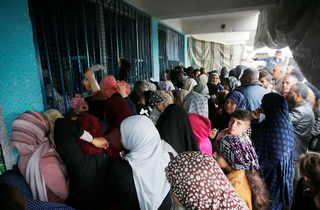However, this shipment underscores the dire situation in Gaza, with the UN urgently calling for daily aid deliveries and improved access, particularly to northern Gaza which they warn is "on the brink of famine."
Despite this welcome development, the UN humanitarians cautioned that the arrival of a separate aid ship, Open Arms, carrying 200 tonnes of relief supplies, is "not a substitute" for the consistent flow of overland assistance desperately needed by Gazans facing starvation.
"Any food and other emergency aid that comes into Gaza is desperately needed," acknowledged Jens Laerke, spokesperson for the UN aid coordination office (OCHA). "But it's not a substitute for the overland transport of food and other emergency aid into Gaza and particularly northern Gaza. It cannot make up for that."
The UN's emphasis on land routes reflects the logistical challenges posed by maritime deliveries. Senior Humanitarian and Reconstruction Coordinator for Gaza, Sigrid Kaag, stressed that "for aid delivery at scale there is no meaningful substitute to the many land routes and entry points from Israel into Gaza." While the new maritime corridor from Cyprus is seen as a "much-needed addition," land routes from Israel and Egypt, particularly Rafah in the south, remain essential for a sustained humanitarian response.
Underscoring the desperate situation, the UN agency for Palestinian refugees (UNRWA) condemned the Israeli refusal to allow so-called "dual-use" items, including even children's medical scissors, into Gaza. UNRWA Commissioner-General Philippe Lazzarini decried the addition of scissors to a "long list of banned items the Israeli Authorities classify as 'for dual use,'" which includes essential supplies like anesthetics, solar lights, and water purification tablets.
With the lives of two million people hanging in the balance, Lazzarini emphasized the urgent need to "facilitate and accelerate" the clearance of humanitarian supplies and delivery of critical items.
The UN is exploring all options, including airdrops, but acknowledges their limitations. WFP chief Cindy McCain warned on Monday that famine is "imminent" in Gaza and can only be averted with an "exponential" increase in humanitarian aid. "If we do not exponentially increase the size of aid going into the northern areas, famine is imminent," she declared.
While Tuesday's delivery offered a temporary reprieve, the WFP had been forced to pause aid deliveries to the north due to safety concerns for staff and the complete breakdown of law and order. WFP chief McCain reiterated, "road access and the use of existing ports and crossings is the only way to get aid into Gaza at the scale that is now required." She emphasized the staggering need for "300 trucks of food entering Gaza every single day."
Adding to the urgency, UNRWA launched its annual Ramadan campaign today, aiming to provide emergency food aid to the most vulnerable Gazans, particularly internally displaced people facing starvation. The campaign will run throughout the holy month, relying on Zakat contributions, a pillar of Islamic faith, to deliver critical food and cash assistance.
The situation in Gaza remains precarious. While Tuesday's delivery offers a lifeline, the UN's stark warnings paint a picture of a population on the brink of famine without a significant increase in aid access and a ceasefire to the ongoing conflict. (ILKHA)



 Güncel
Güncel
 Güncel
Güncel
 Güncel
Güncel
 Dünya
Dünya
 Dünya
Dünya
 Dünya
Dünya
 Dünya
Dünya
 Dünya
Dünya
 Dünya
Dünya
 Dünya
Dünya





